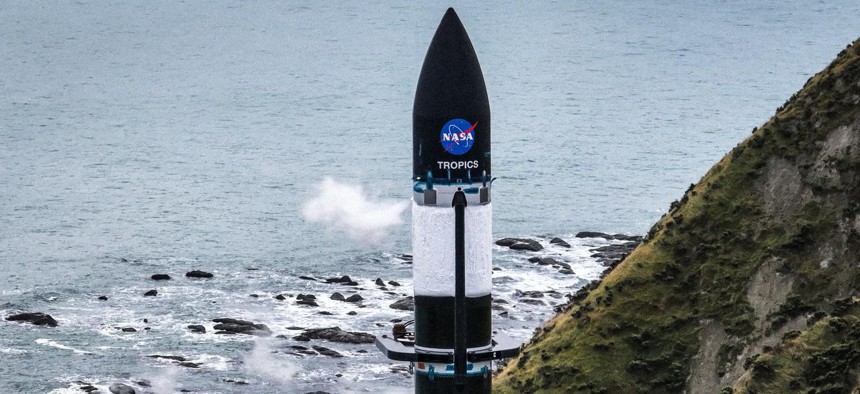NASA, Rocket Lab Launch Tropical Storm Observing CubeSats

Rocket Lab’s Electron rocket at Launch Complex 1 in Mahia, New Zealand on April 28, 2023. NASA’s Time-Resolved Observations of Precipitation structure and storm Intensity with a Constellation of Smallsats (TROPICS) CubeSats are secured in the payload fairing atop the rocket. Rocket Labs
The first pair of CubeSats launched this week—with the remaining planned for launch in a couple of weeks—to help study tropical storms.
NASA and Rocket Lab launched two of the agency’s CubeSats on Sunday to study tropical cyclones with greater frequency than existing satellites, according to an agency announcement.
The launch was part of the Time-Resolved Observations of Precipitation structure and storm Intensity with a Constellation of Smallsats—or TROPICS—which is “a constellation of four identical CubeSats to observe tropical cyclones in a unique, inclined low Earth orbit over Earth’s tropics.” NASA noted this orbit enables the CubeSats to travel over a storm approximately every hour, while current weather tracking satellites would travel over a storm once every six hours.
“Providing more frequent imaging will not only improve our situational awareness when a hurricane forms,” Karen St. Germain, director of Earth Science Division at NASA Headquarters, said. “The data will provide information to models that help us determine how a storm is changing over time, which in turn helps to improve forecasts from our partners like the National Hurricane Center and Joint Typhoon Warning Center.”
The CubeSats were launched on an Electron Rocket from Rocket Lab’s Launch Complex in New Zealand at 9pm EDT on Sunday—or 1pm NZST on Monday. According to the announcement, commands were successfully sent to the first CubeSat and then communication with the second CubeSat was established.
Massachusetts Institute of Technology’s Bill Blackwell is leading the TROPICS team and serving as principal investigator. The team also includes researchers from NASA, the National Oceanic and Atmospheric Administration, universities and commercial partners. NASA’s Launch Services Program is managing the launch service.
“We are extremely proud of all our partners, including MIT Lincoln Labs, Blue Canyon Technologies, KSAT and Rocket Lab for successfully executing on this first launch,” said Ben Kim, TROPICS program executive for NASA’s Earth Science Division. “We look forward to the entire constellation being on-orbit to realize the benefits for the agency, as well as for our colleagues around the world.”
Rocket Lab was selected for the TROPICS mission in November 2022 as part of the Venture-Class Acquisition of Dedicated and Rideshare contract. This was the first launch for the contract. The next two satellites will launch in about two weeks and be timed to insert into the TROPICS constellation.






